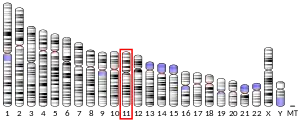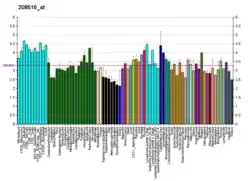Melatonin receptor 1B
Melatonin receptor 1B, also known as MTNR1B, is a protein that in humans is encoded by the MTNR1B gene.[4][5]
Function
This gene encodes the MT2 protein, one of two high-affinity forms of a receptor for melatonin, the primary hormone secreted by the pineal gland. This gene product is an integral membrane protein that is a G-protein coupled, 7-transmembrane receptor. It is found primarily in the retina and brain; however, this detection requires RT-PCR. It is thought to participate in light-dependent functions in the retina and may be involved in the neurobiological effects of melatonin.[4] Besides the brain and retina this receptor is expressed on the bone forming cells where it regulates their function in depositing bone.[6]
Clinical significance
Several studies have identified MTNR1B receptor mutations that are associated with increased average blood sugar level and around a 20 percent elevated risk of developing type 2 diabetes.[7][8][9] MTNR1B mRNA is expressed in human islets, and immunocytochemistry confirms that it is primarily localized in beta cells in islets.[8]
Ligands
The following MT2R ligands have selectivity over MT1R:
References
- GRCh38: Ensembl release 89: ENSG00000134640 - Ensembl, May 2017
- "Human PubMed Reference:". National Center for Biotechnology Information, U.S. National Library of Medicine.
- "Mouse PubMed Reference:". National Center for Biotechnology Information, U.S. National Library of Medicine.
- "Entrez Gene: MTNR1B melatonin receptor 1B".
- Reppert SM, Godson C, Mahle CD, Weaver DR, Slaugenhaupt SA, Gusella JF (Sep 1995). "Molecular characterization of a second melatonin receptor expressed in human retina and brain: the Mel1b melatonin receptor". Proceedings of the National Academy of Sciences of the United States of America. 92 (19): 8734–38. Bibcode:1995PNAS...92.8734R. doi:10.1073/pnas.92.19.8734. PMC 41041. PMID 7568007.
- Sharan K, Lewis K, Furukawa T, Yadav VK (2006). "Regulation of bone mass through pineal-derived melatonin-MT2 pathway". J Pineal Res. 79A (2): 263–270. doi:10.1111/jpi.12423. PMC 5575491. PMID 28512916.
- "Gene That Regulates Glucose Levels And Increases Risk For Diabetes Identified". ScienceDaily. 2008-06-28. Retrieved 2009-01-18.; "Body Clock Linked To Diabetes And High Blood Sugar In New Genome-wide Study". ScienceDaily. 2008-12-08. Retrieved 2009-01-18.; "Is There A Relationship Between Sleep-wake Rhythm And Diabetes? A New Gene Variant Influences Fasting Glucose Levels Via The Melatonin Metabolism". ScienceDaily. 2009-01-16. Retrieved 2009-01-18.
- Prokopenko I, Langenberg C, Florez JC, Saxena R, Soranzo N, Thorleifsson G, et al. (Jan 2009). "Variants in MTNR1B influence fasting glucose levels". Nature Genetics. 41 (1): 77–81. doi:10.1038/ng.290. PMC 2682768. PMID 19060907.; Lyssenko V, Nagorny CL, Erdos MR, Wierup N, Jonsson A, Spégel P, et al. (Jan 2009). "Common variant in MTNR1B associated with increased risk of type 2 diabetes and impaired early insulin secretion". Nature Genetics. 41 (1): 82–88. doi:10.1038/ng.288. PMC 3725650. PMID 19060908.; Bouatia-Naji N, Bonnefond A, Cavalcanti-Proença C, Sparsø T, Holmkvist J, Marchand M, et al. (Jan 2009). "A variant near MTNR1B is associated with increased fasting plasma glucose levels and type 2 diabetes risk". Nature Genetics. 41 (1): 89–94. doi:10.1038/ng.277. PMID 19060909. S2CID 205347673.
- Staiger H, Machicao F, Schäfer SA, Kirchhoff K, Kantartzis K, Guthoff M, Silbernagel G, Stefan N, Häring HU, Fritsche A (2008). Maedler K (ed.). "Polymorphisms within the novel type 2 diabetes risk locus MTNR1B determine beta-cell function". PLOS ONE. 3 (12): e3962. Bibcode:2008PLoSO...3.3962S. doi:10.1371/journal.pone.0003962. PMC 2597741. PMID 19088850.
- Rivara S, Lodola A, Mor M, Bedini A, Spadoni G, Lucini V, Pannacci M, Fraschini F, Scaglione F, Sanchez RO, Gobbi G, Tarzia G (Dec 2007). "N-(substituted-anilinoethyl)amides: design, synthesis, and pharmacological characterization of a new class of melatonin receptor ligands". Journal of Medicinal Chemistry. 50 (26): 6618–26. doi:10.1021/jm700957j. PMID 18052314.
- Bedini A, Spadoni G, Gatti G, Lucarini S, Tarzia G, Rivara S, Lorenzi S, Lodola A, Mor M, Lucini V, Pannacci M, Scaglione F (Dec 2006). "Design and synthesis of N-(3,3-diphenylpropenyl)alkanamides as a novel class of high-affinity MT2-selective melatonin receptor ligands". Journal of Medicinal Chemistry. 49 (25): 7393–403. doi:10.1021/jm060850a. PMID 17149869.
- Yous S, Durieux-Poissonnier S, Lipka-Belloli E, Guelzim H, Bochu C, Audinot V, Boutin JA, Delagrange P, Bennejean C, Renard P, Lesieur D (Mar 2003). "Design and synthesis of 3-phenyl tetrahydronaphthalenic derivatives as new selective MT2 melatoninergic ligands". Bioorganic & Medicinal Chemistry. 11 (5): 753–59. doi:10.1016/S0968-0896(02)00473-X. PMID 12538005.
- Mattson RJ, Catt JD, Keavy D, Sloan CP, Epperson J, Gao Q, Hodges DB, Iben L, Mahle CD, Ryan E, Yocca FD (Mar 2003). "Indanyl piperazines as melatonergic MT2 selective agents". Bioorganic & Medicinal Chemistry Letters. 13 (6): 1199–202. doi:10.1016/S0960-894X(03)00090-8. PMID 12643943.
Further reading
- Brzezinski A (Jan 1997). "Melatonin in humans". The New England Journal of Medicine. 336 (3): 186–95. doi:10.1056/NEJM199701163360306. PMID 8988899.
- Reppert SM, Godson C, Mahle CD, Weaver DR, Slaugenhaupt SA, Gusella JF (Sep 1995). "Molecular characterization of a second melatonin receptor expressed in human retina and brain: the Mel1b melatonin receptor". Proceedings of the National Academy of Sciences of the United States of America. 92 (19): 8734–8. Bibcode:1995PNAS...92.8734R. doi:10.1073/pnas.92.19.8734. PMC 41041. PMID 7568007.
- Reppert SM, Weaver DR, Ebisawa T, Mahle CD, Kolakowski LF (May 1996). "Cloning of a melatonin-related receptor from human pituitary". FEBS Letters. 386 (2–3): 219–24. doi:10.1016/0014-5793(96)00437-1. PMID 8647286. S2CID 38587331.
- Niles LP, Wang J, Shen L, Lobb DK, Younglai EV (Oct 1999). "Melatonin receptor mRNA expression in human granulosa cells". Molecular and Cellular Endocrinology. 156 (1–2): 107–10. doi:10.1016/S0303-7207(99)00135-5. PMID 10612428. S2CID 42730113.
- Ebisawa T, Uchiyama M, Kajimura N, Kamei Y, Shibui K, Kim K, Kudo Y, Iwase T, Sugishita M, Jodoi T, Ikeda M, Ozeki Y, Watanabe T, Sekimoto M, Katoh M, Yamada N, Toyoshima R, Okawa M, Takahashi K, Yamauchi T (Feb 2000). "Genetic polymorphisms of human melatonin 1b receptor gene in circadian rhythm sleep disorders and controls". Neuroscience Letters. 280 (1): 29–32. doi:10.1016/S0304-3940(99)00981-7. PMID 10696804. S2CID 24900890.
- Roy D, Angelini NL, Fujieda H, Brown GM, Belsham DD (Nov 2001). "Cyclical regulation of GnRH gene expression in GT1-7 GnRH-secreting neurons by melatonin". Endocrinology. 142 (11): 4711–20. doi:10.1210/en.142.11.4711. PMID 11606436.
- Ayoub MA, Couturier C, Lucas-Meunier E, Angers S, Fossier P, Bouvier M, Jockers R (Jun 2002). "Monitoring of ligand-independent dimerization and ligand-induced conformational changes of melatonin receptors in living cells by bioluminescence resonance energy transfer". The Journal of Biological Chemistry. 277 (24): 21522–8. doi:10.1074/jbc.M200729200. PMID 11940583.
- Yuan L, Collins AR, Dai J, Dubocovich ML, Hill SM (Jun 2002). "MT(1) melatonin receptor overexpression enhances the growth suppressive effect of melatonin in human breast cancer cells". Molecular and Cellular Endocrinology. 192 (1–2): 147–56. doi:10.1016/S0303-7207(02)00029-1. PMID 12088876. S2CID 54393974.
- Slominski A, Pisarchik A, Zbytek B, Tobin DJ, Kauser S, Wortsman J (Jul 2003). "Functional activity of serotoninergic and melatoninergic systems expressed in the skin". Journal of Cellular Physiology. 196 (1): 144–53. doi:10.1002/jcp.10287. PMID 12767050. S2CID 24534729.
- Ayoub MA, Levoye A, Delagrange P, Jockers R (Aug 2004). "Preferential formation of MT1/MT2 melatonin receptor heterodimers with distinct ligand interaction properties compared with MT2 homodimers". Molecular Pharmacology. 66 (2): 312–21. doi:10.1124/mol.104.000398. PMID 15266022. S2CID 39243124.
- Mazna P, Berka K, Jelinkova I, Balik A, Svoboda P, Obsilova V, Obsil T, Teisinger J (Jul 2005). "Ligand binding to the human MT2 melatonin receptor: the role of residues in transmembrane domains 3, 6, and 7". Biochemical and Biophysical Research Communications. 332 (3): 726–34. doi:10.1016/j.bbrc.2005.05.017. PMID 15913560.
- Ha E, Choe BK, Jung KH, Yoon SH, Park HJ, Park HK, Yim SV, Chung JH, Bae HS, Nam M, Baik HH, Hong SJ (Sep 2005). "Positive relationship between melatonin receptor type 1B polymorphism and rheumatoid factor in rheumatoid arthritis patients in the Korean population". Journal of Pineal Research. 39 (2): 201–5. doi:10.1111/j.1600-079X.2005.00237.x. PMID 16098099. S2CID 9980281.
- Savaskan E, Jockers R, Ayoub M, Angeloni D, Fraschini F, Flammer J, Eckert A, Müller-Spahn F, Meyer P (Feb 2007). "The MT2 melatonin receptor subtype is present in human retina and decreases in Alzheimer's disease". Current Alzheimer Research. 4 (1): 47–51. doi:10.2174/156720507779939823. PMID 17316165.
- Suzuki S, Masui Y, Ohnuki M, Miyakoda G, Mori T, Nakajima K, Sato M (Apr 2007). "Induction of metallothionein synthesis by cilostazol in mice and in human cultured neuronal cell lines". Biological & Pharmaceutical Bulletin. 30 (4): 791–4. doi:10.1248/bpb.30.791. PMID 17409522.
- Qiu XS, Tang NL, Yeung HY, Lee KM, Hung VW, Ng BK, Ma SL, Kwok RH, Qin L, Qiu Y, Cheng JC (Jul 2007). "Melatonin receptor 1B (MTNR1B) gene polymorphism is associated with the occurrence of adolescent idiopathic scoliosis". Spine. 32 (16): 1748–53. doi:10.1097/BRS.0b013e3180b9f0ff. PMID 17632395. S2CID 6777367.
External links
- "Melatonin Receptors: MT2". IUPHAR Database of Receptors and Ion Channels. International Union of Basic and Clinical Pharmacology.
This article incorporates text from the United States National Library of Medicine, which is in the public domain.


